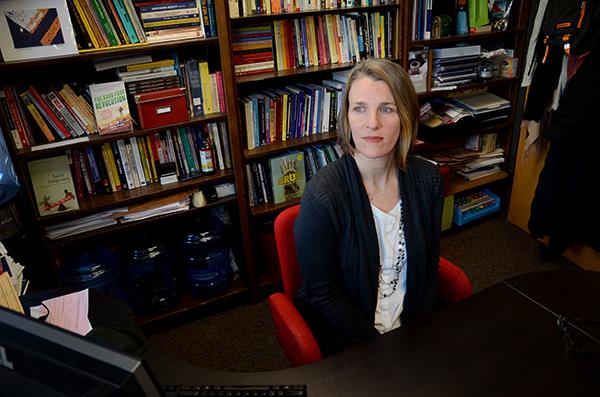Though students may approach their professors for advice about a sexual assault, three top faculty members recently said they didn’t know they’re legally obligated to report the allegation, even if a student comes to them in confidence.
Members of the Faculty Senate, a group that has helped shape the University’s sexual assault response, said at a recent meeting that they didn’t know they were required to report sexual assault allegations to the University Police Department and GW officials – and were worried that their colleagues might also be unaware.
GW already sends faculty-wide emails and teaches professors about the University’s sexual assault resources at department meetings and new employee orientation. A faculty member’s role in responding to sexual assault is also available online in the University’s 20-page sexual harassment policy.
But faculty say though they do hear about how to help a student cope with a sexual assault, information about their responsibilities can get lost in their email inboxes. And since so many students seek advice from faculty, professors say they want to know the best way to direct them to resources.
Melani McAlister, the head of the American Studies department, said at December’s Faculty Senate meeting that she just learned she must report student sexual assault allegations to the police because she is a department chair. That’s a tricky balancing act, McAlister said, because students also come to her for advice about family issues and problems outside of school.
“We can do well to be more trained in the specifics of what the issues are,” she said.
Faculty should alert students of their role as mandatory reporters of sexual assault without making the student afraid to come forward, said Bridgette Harwood, the executive director of the Network for Victim Recovery of D.C.
“How do you have that conversation with the survivor without discouraging them, but empowering them to understand how to handle the situation?” Harwood said.
She said to make the process smoother, faculty should receive training about the effects of trauma and should know how to accommodate students who may ask for extensions or miss class because of trauma.
Lost in translation
Gregg Brazinsky, an assistant professor of history and international affairs, said that having so many offices working on the University’s response to sexual assault could be confusing for students.
“The bureaucracy surrounding this issue seems to be complex and unwieldy,” he said at the December Faculty Senate meeting. “Might there be a way to simplify it for the students so they have one clear path, very clear route of what they could do?”
To help faculty better understand GW’s policies, Vice Provost for Diversity and Inclusion Terri Harris Reed said her office has started creating an online “module” that tests employees’ knowledge about GW’s sexual assault policies using practice scenarios. GW has also linked with eight other D.C. universities to hold trainings and meetings about sexual assault and the best ways for colleges to respond.

“The University’s strong preference is that the matter be reported, but does not rule out situations in which the information conveyed by a student, considered in its entirety, cause the faculty member to conclude that the best interests of neither the student nor the University require the matter to be reported to [UPD],” Reed said in an email.
Charles Garris, an engineering professor and the chair of the Faculty Senate’s executive committee, said faculty should know how to direct students to resources, but shouldn’t take a major advising role if a student approaches them to talk about a sexual assault allegation.
“We don’t really have experience in this sort of thing. Who knows what kind of advice they would get? It’s important that the students get professional advice,” Garris said.
Making a ‘complicated problem’ clearer
A committee of students and faculty focused on the University’s response to sexual violence has floated ideas like small group trainings or a chart to show the sexual assault reporting process. Adding faculty training or creating resources would be the first public changes to come out of the committee, which launched at the end of last semester.
Ivy Ken, an associate sociology professor and committee member, said making resources easier for faculty to access could help them understand a “complicated problem.”
Faculty members will also often reach out to each other to ask for advice about how to handle a new situation, Ken said.
“If there’s a feminist in the department, a woman in the department, if they themselves don’t know what to do, then the first thing a lot of them do is ask each other,” Ken said.
The University could train small groups in responding to sexual assault so they can then teach their colleagues, said Laura Zillman, the vice president of Students Against Sexual Assault and a member of the committee.
Zillman said the group also hopes to create diagrams or shorter, more readable versions of University sexual assault policies so faculty can “be a little more coordinated in their response.”
“Maybe making like a CliffsNotes version or a diagram to give to professors to understanding without flipping through a novel,” Zillman said. “So you know, these are the steps you take if somebody discloses to you.”
Sylvia Marotta-Walters, a counseling professor in the Graduate School of Education and Human Development and a researcher who has studied trauma and the treatment of sexual assault survivors, said faculty can play many roles when talking with students who come forward.
“In the classroom, they can provide accurate information about the scope of the problem or resources that are available,” Marotta-Walters said. “In an advising capacity, students who have solid relationships with faculty can seek them out for specific help in a private setting.”







